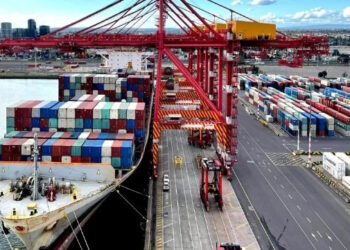
The Secretary-General of the African Continental Free Trade Area (AfCFTA), Mr Wamkele Mene, has reaffirmed his commitment to reducing and eliminating intra-African and investment barriers.
Speaking at a Round-Table on Nigeria’s Implementation of the AfCFTA Protocol in Abuja on Thursday, Mene stated that these constraints hinder the continent from reaching its full potential.
This comes even as Nigeria’s Minister of Industry, Trade, and Investment, Dr Jumoke Oduwole told the AfCFTA Secretary-General that the nation eyes an export market of up to $79bn through the expansion of her export capacity within the Continental Free Trade Area framework.
The minister listed anticipated benefits of AfCFTA to the country’s economy, including “an estimated 15-17 per cent increased growth in gross domestic product, creation of 11 million new jobs across sectors, and expansion of export capacity by at least 15 per cent, amounting to $79bn in increased exports.”
On his part, the AfCFTA Secretary General noted that the secretariat had developed a legal framework to help eliminate and reduce such barriers.
Mene emphasised that the protocol on women and youth in trade aimed to eliminate the barriers faced by young people and women-owned businesses.
“Our heads of states have told us in the shortest period of time, to eliminate these intra-Africa barriers, including free movement of persons.
“We are ready to eliminate these constraints,” he said.
The secretary-general also highlighted the importance of the Women and Youth on Trade and Digital Trade Protocol, which were adopted by heads of states in February 2024 to promote inclusive trade and development in Africa.
“These are two important protocols that complement each other,” he said.
Meme explained that they address the significant barriers faced by women-owned businesses and youth entrepreneurs in accessing new markets across the continent.
He added that the first certificate of origin issued by Nigeria was to a women-owned business, which enabled the business to access new markets outside Nigeria and ECOWAS.
“So these are the practical steps of working together with our development partners, that enable us to move beyond aspirations about women-owned businesses and businesses owned by young people,” he said.
Oduwole harped on Nigeria’s IT edge in Africa. She said, “Nigeria is a leader in digital trade within AfCFTA, (having achieved) the launch of the Technology Export and Digital Trade Desk developed a digital economy and e-governance bill to address electronic communications and signatures and ran initiatives like the National Talent Export Programme and Outsource to Nigeria Initiative.
She also mentioned the government digital tech and creative entrepreneurship programme, known as the ‘Investment in Digital and Creative Enterprises’ and the ‘3 Million Tech Talent Programme,’ and more as efforts to close knowledge gaps in the digital ecosystem.”
“There is compelling data on Nigeria’s digital economy,” Oduwole added. “Information Communication Technology sector contributing 20 per cent to GDP (Q2 2024), e-commerce spending projected to reach $75bn by 2025 and digital trade revenue growth from $5.09bn in 2019 to a projected $18.3bn in 2026.”
Further, Oduwole emphasised that the country has been updating its trade policy to align with AfCFTA objectives.
She highlighted that Nigeria has submitted its Schedule of Tariffs and Services, enhanced private sector engagement to foster readiness for intra-African trade opportunities, and assumed a positive approach to trade facilitation and ease of doing business.
Oduwole stressed the need to partner and collaborate with the AfCFTA Secretariat and other relevant stakeholders, noting, “I would like to emphasise the importance of partnerships with stakeholders such as Afreximbank and the launch of the $1bn Automobile Industry Facility Fund to support industrialisation efforts.
“I call for continued dialogue and capacity building to ensure inclusivity and the successful implementation of the AfCFTA.”
Similarly, the Minister of Communication, Innovation and Digital Economy, Dr Olatunbosun Tijani, urged stakeholders to effectively implement the protocol on digital trade.
He stressed on the importance of strong collaboration to enhance investment in the African digital economy.















